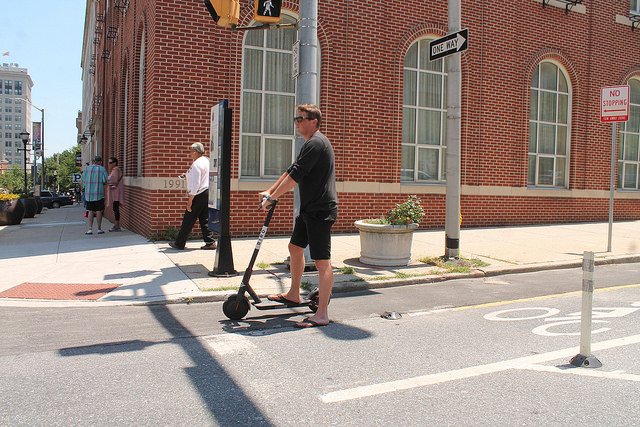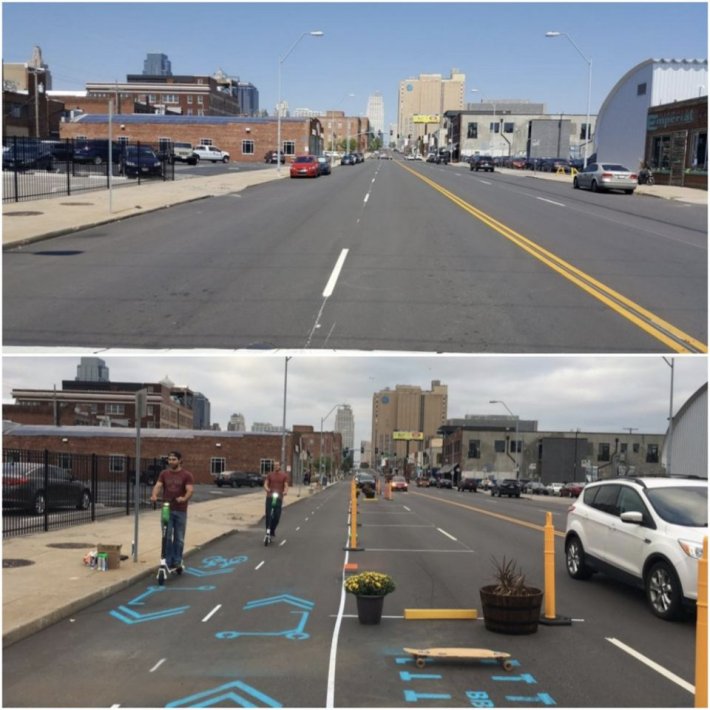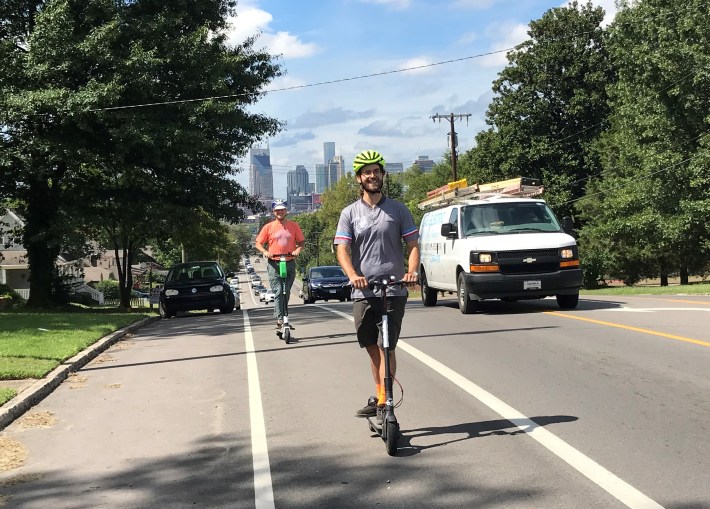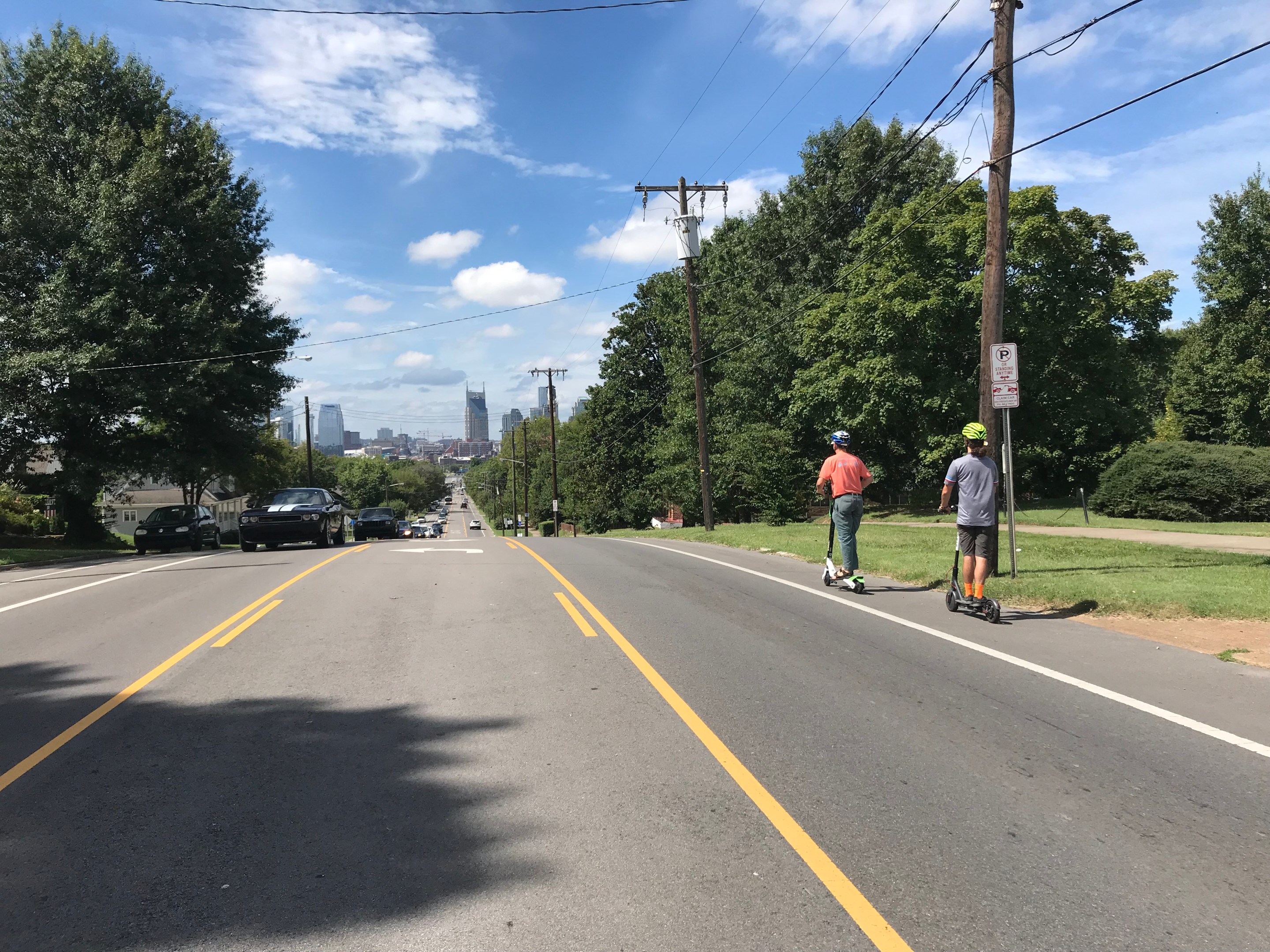Bike advocacy has changed dramatically since privately owned e-scooters began flooding American cities about a year ago, advocates from cities across the country say.
We reached out to key bike advocates in Kansas City, Baltimore and Nashville to get a sense of just how big of an impact e-scooters have made in their cities. Independently, all reported it is pretty huge — especially in the way e-scooters expand the pool of people using "active" transportation.
Scooters have raised concerns about safety and sidewalk accessibility in the press. A couple bike advocacy leaders also raised some potential issues as well. Here's what they had to say:
In Baltimore, a desperately needed new option

Liz Cornish, the executive director of Bikemore, says the arrival of e-scooters and dockless bikeshare in Baltimore has made her job much, much easier. About 180,000 people have registered as users on either Bird or Lime scooters since they appeared on city streets in July -- an enormous number.
"The ridership in Baltimore has just been way larger than I think anyone had anticipated," Cornish said.
Some of the reasons seems to be specific to Baltimore, she said, while others don't.
But Baltimore has long struggled to implement a workable city-sponsored bike share.
"The challenge with docked bike share ... in order for it to work stations have to be sited close together," said Cornish. "In a segregated city like Baltimore, a decision has to be made who gets the stations first."
Dockless bike and dockless scooters have neutralized that concern, she said.
"The function of being dockless these things can be deployed in more different neighborhoods from day one," she said. "It immediately removed the argument that these vehicles are only for certain people."
And it helped removed some other key concerns as well.
"People have a perception that we can’t have nice things because everything gets vandalized or stolen," she said. "Since it’s a private company, now the perceived risks are removed."
Cornish said the scooters and bikes seem to be filling a real need.
"We have such an underperforming transit system," she said. "Ride share like Uber and Lyft just doesn’t work as a replacement for public transit just doesn’t work in a city like Baltimore … but bike share and dockless are super affordable."
Scooters also lack some of the cultural baggage bicycles have.
"Some of the barriers to riding bicycles is different cultures have different reactions to riding a bike," she said. "Particular in communities that have experienced poverty … this idea that you’re going to opt into riding a bike … that’s a barrier."
Dockless bikes and e-scooters have definitely made advocating for bike infrastructure easier in Baltimore, says Cornish.
"It’s slow growing to grow bike ridership in any city. The amount of human infrastructure you have to build to get someone to mode shift is huge," she said. "Now that the scooters and bikes are here .. there are thousands tens of thousands of new people that have just become vulnerable road users."
"Any reasonable person who gets on a scooter doesn’t want to ride in 35 mph traffic," she said. "Now they’re having an experience that everyone who’s been riding a bike has been talking about for years."
In Kansas City, 'like a light switch turned on'

Eric Bunch at Bike Walk Kansas City agrees that e-scooters have a lot of appeal and are being well used in Kansas City.
One of the most noticeable benefits is that e-scooters have really helped create a street life in Kansas City, that was lacking until recently, even downtown.
The first improvement came when Kansas City Streetcar opened in 2016, Bunch said. "It was like a light switch flipped on."
"It felt like another one when the scooters came," he told Streetsblog. "I do think that has been a really impressive change."
"You can be downtown and just look up the street and see five different people on scooters. Even in the winter, it’s common to see them everywhere."
Bunch said the presence of e-scooter moving the conversation about bike lanes forward as well. In the fall, BikeWalkKC helped create a pop up bike and scooter lane in Oak Street.
"These scooters are really showing that we have to build bike lanes all over the place," he said. "It is bringing more urgency for infrastructure. At least it’s demonstrated there is a demand for getting around town on something … other than cars."
But Bunch has some concerns as well. For one, Bike Walk KC has long managed the city's docked bikeshare system. Kansas City has negotiated with Bird and Lime to receive $1/scooter/day in payments. Lime was even making addition payments Bike Walk KC and the local transit advocacy group for the privilege of operating in the city.
The money has been great. It provided several thousand dollars in operating support to Bike Walk KC, Bunch said. But Bunch says Bike Walk KC can't afford to be held to the same standard with their docked bike share, which they operate at a loss as a public service.
"They’re doing that to gain market share and it weeds out the others," he said. "If they hold us to the same standard, then we’re locked out. We cannot possibly make that work."
Bunch is also concerned what will happen if the companies' can't make money the way they imagined over the winter. Lime already pulled out of Kansas City for the winter.
"If the cities enable these companies to be here and it comes a the expense of these other programs .. and they’re no longer around where does that leave people who rely on them?"
In Nashville, an Exciting Start

Nora Kern, the executive director of Walk Bike Nashville, says a lot of people are using e-scooters in Nashville — and it's a different crowd than has been biking, she says.
"Scooters seem to be achieving some of the goals that other modes have been trying to but haven’t been able to achieving yet," she said, in terms of getting people out of cars.
"If it works, I think it could really really be a game changer," she said.
Nashville still has very little bike infrastructure, however. It's making the need for protected infrastructure much more urgent, she said. Many of the scooter riders seem to be much less experienced than commuter cyclists. In addition, the e-scooters themselves "feel more vulnerable than bikes."
In Nashville, people are allowed to ride scooters on the sidewalks, as long as it's not a business district, and Kern thinks that is helpful and appropriate, given the context. But even in the downtown area, there aren't any bike lanes. Although Walk Bike Nashville is gearing up for a campaign to add some.
Bird and Lyft are even providing some financial support for the campaigns.
Some of the media reporting on e-scooters has been somewhat sensational, Kerns says, or has ignored the wider context. Cars killed 23 pedestrians in Nashville last year.
But there have also been issues with people parking them on the sidewalks, sometimes creating accessibility issues for people with disabilities.
"We don’t really have much bike parking," she said. "There aren’t really a lot of good places to park them. We would really like to see the city a lot more proactive about it instead of just complaining about it."
Some medical researchers in Nashville have raised concerns about injuries. But right now, the evidence is mostly anecdotal and it's hard to evaluate, said Kern.
But she said there's a lot that's unknown.
"They have small wheels. There's some question about how well they handle on potholes."
"What is safe speed?" she said. "I think it’d be good to have some reliable research and comparison for what’s working in other cities."
"I’m not sure the technology is perfect yet and I think that is causing some of the problems with crashes," she added.







